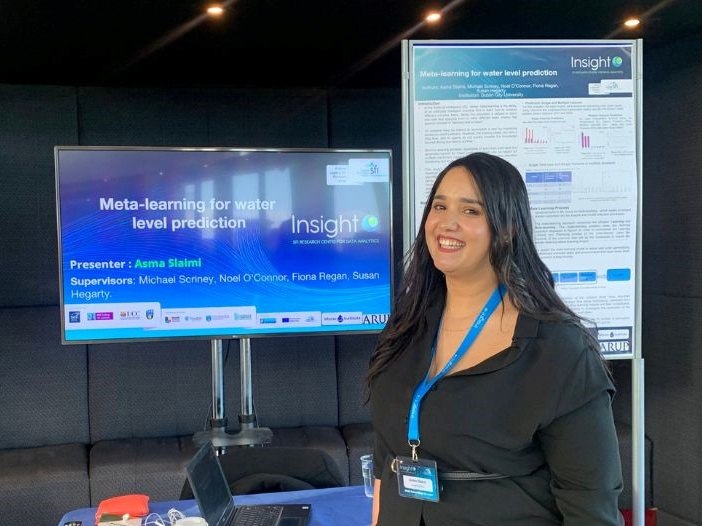
DCU researcher Asma Slaimi gives an insight into her work in AI and machine learning for water management systems.
Asma Slaimi is currently working on a PhD at the School of Engineering in Dublin City University and at the Insight SFI Research Centre for Data Analytics.
During her master’s degree, Slaimi worked with Dr Brian Davis at the Insight centre. Her project entailed developing a supervised machine learning model for an e-recruitment platform, as part of the Data Live project.
She used ontology-based named entity recognition (NER) to develop her model, whereby a collection of data sets containing words, terms and their interrelations (an ontology) is used to train a model to recognise known terms and concepts in unstructured or semi-structured texts.
With this grounding in AI and machine learning, Slaimi was well placed to pursue a PhD in develop complex AI models to manage water systems.
Tell us about your current research.
I’m working on a collaborative project with Arup, which focuses on applying artificial intelligence and machine learning to water management. The project was conceived due to an increasing need for efficient, data-driven solutions for water resource management.
I’m fortunate to work with an excellent supervisor team comprising Dr Michael Scriney, Dr Susan Hegarty, Prof Fiona Regan and Prof Noel E O’Connor.
Over time, our research has expanded to explore various facets of AI and machine learning technologies, aiming for actionable insights that could drastically improve water management practices.
In your opinion, why is your research important?
Our research promises to revolutionise water management systems by making them more efficient, sustainable and cost effective. With climate change affecting water resources worldwide, the potential impact of this research is immense.
By harnessing the power of artificial intelligence and machine learning, we can predict water usage, monitor quality and detect issues, ensuring this critical resource’s optimal utilisation.
What inspired you to become a researcher?
My inspiration to become a researcher was fuelled by my belief that science can make a difference in society. My experience as an intern under Dr Brian Davis at the Insight Centre for Data Analytics solidified this desire.
The dynamic work environment and the real-world applications of the research I was involved in were incredibly motivating. Then, I realised my skills and passion lay in contributing to groundbreaking research that could have a tangible societal impact.
What are some of the biggest challenges or misconceptions you face as a researcher in your field?
One of the significant challenges is explaining the complexity and potential benefits of AI and machine learning to stakeholders who may not have a technical background. There’s a misconception that AI is a silver bullet for all problems, but the reality is more nuanced. Implementing AI solutions in a sensitive area like water management involves dealing with numerous variables and ethical considerations.
Do you think public engagement with science has changed in recent years? How do you encourage engagement with your work?
The Covid-19 pandemic highlighted the importance of scientific research and public engagement. People are more interested in understanding how science can solve real-world problems, and this provides an excellent platform for researchers like me.
To encourage engagement with my work, I actively participate in academic conferences, write research papers in accessible language and leverage social media to share updates and findings. I believe it’s crucial to make science accessible and relatable to the public to foster a broader understanding and appreciation.
10 things you need to know direct to your inbox every weekday. Sign up for the Daily Brief, Silicon Republic’s digest of essential sci-tech news.

